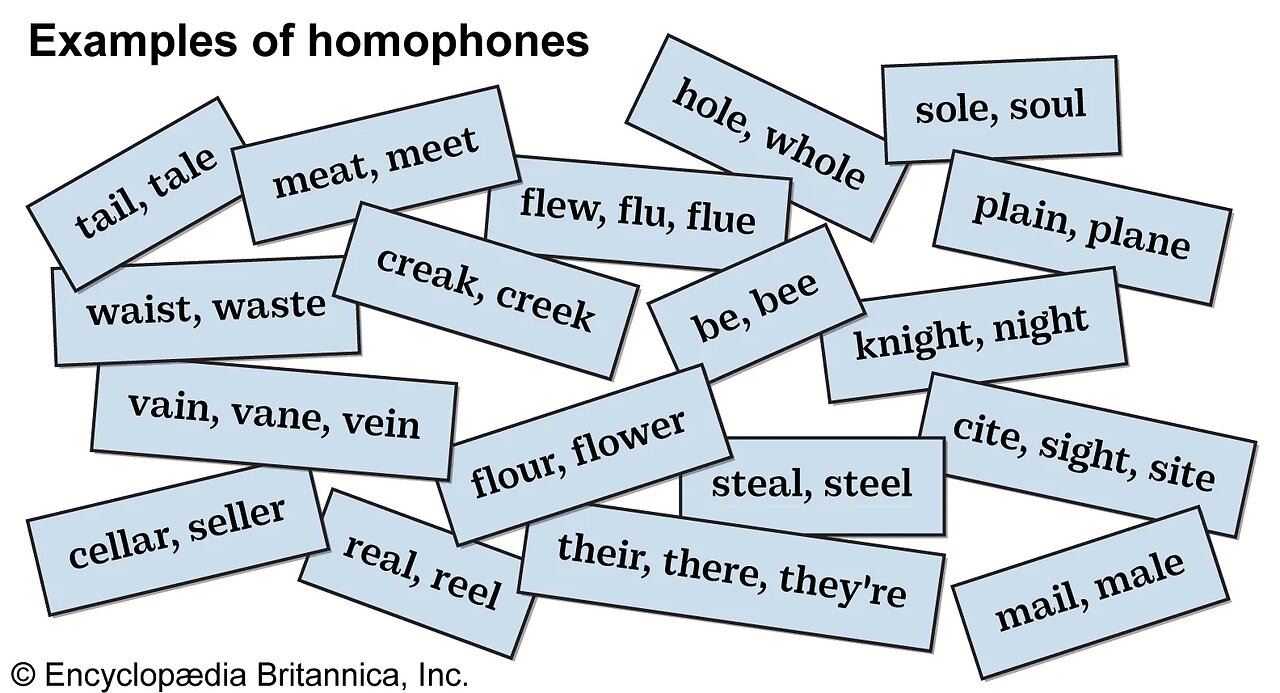Premium Only Content

PIECE vs. PEACE: How-to Use : Homophones Made Easy: PIECE vs. PEACE
PIECE vs. PEACE: How-to Use : Homophones Made Easy: PIECE vs. PEACE
Homophones are words in the English language that sound the same when spoken but have different meanings and often different spellings. They can be a bit tricky, especially for students learning English as a second language, but understanding them is important for clear communication. Here's a more detailed explanation:
1. Sound the Same: Homophones are words that are pronounced in the same way, or they have very similar pronunciations. This means that when you say them out loud, they sound identical, even though they may be spelled differently.
2. Different Meanings: Despite sounding the same, homophones have different meanings. Each word has its own unique definition and usage in sentences. This is why it's crucial to understand which homophone to use in a particular context to convey the intended meaning.
3. Different Spellings: Homophones are often spelled differently from each other. In some cases, the spelling may be quite similar, but there are usually subtle differences. These differences in spelling are what distinguish one homophone from another.
4. Common Examples: Homophones are common in the English language. Some well-known examples include "there," "their," and "they're," which all sound the same but have different meanings and spellings.
5. Context Matters: To choose the correct homophone in a sentence, you need to consider the context or the words around it. Understanding the context helps you determine which homophone is appropriate to convey the intended message.
6. Practice is Key: Learning homophones can be challenging, but with practice and exposure to the language, you can become proficient at using them correctly. Reading, listening, and speaking in English are all helpful ways to improve your understanding of homophones.
7. Common Homophones: There are many sets of homophones in English, such as "to," "too," and "two," "its" and "it's," "your" and "you're," "where" and "wear," and many more. Each set has distinct meanings and uses.
8. Clear Communication: Understanding and using homophones correctly is essential for clear and effective communication in English. Using the wrong homophone in a sentence can lead to misunderstandings, so it's important to pay attention to these words.
In summary, homophones are words in English that sound the same but have different meanings and spellings. Learning to distinguish and use them correctly is an important aspect of improving your English language skills, especially for those studying English as a second language. Practice and exposure to the language will help you become more confident in using homophones in your writing and speaking.
-
 3:16:50
3:16:50
Laura Loomer
9 hours agoEP137: EXPOSED: How Tucker Carlson Became Hunter Biden's Wingman
71.7K81 -
 4:22:34
4:22:34
Akademiks
8 hours agoNicki Minaj vs Dez Bryant. Trump Calls out Charlamagne. Diddy Denied Bail Again! ICEMAN soon?
57.2K3 -
 3:16:28
3:16:28
Nerdrotic
10 hours ago $9.32 earnedNerdrotic at Night 504
82.9K3 -
 8:20:30
8:20:30
Dr Disrespect
17 hours ago🔴LIVE - DR DISRESPECT - WARZONE - RANDOMLY GENERATED LOADOUTS EVENT
232K9 -
 1:36:07
1:36:07
Glenn Greenwald
12 hours agoTrump Admin Unleashes More Policies That Prioritize Israel Over American Citizens; The Smear Campaign Against Gaza Aid Whistleblower with Journalist Mel Witte | SYSTEM UPDATE #497
146K193 -
 58:14
58:14
MattMorseTV
10 hours ago $14.81 earned🔴Hakeem just lost EVERYTHING.🔴
84.4K63 -
 9:21:36
9:21:36
Rallied
14 hours ago $3.19 earnedWARZONE CHALLENGES WITH DRDISRESPECT & BOB
86K5 -
 7:15:14
7:15:14
SpartakusLIVE
10 hours agoMonday MOTIVATION leaves viewers ENERGIZED and MAXIMIZED to conquer the week
39.2K1 -
 3:19:17
3:19:17
Barry Cunningham
10 hours agoPRESIDENT TRUMP IS THE SUM OF THEIR FEARS! IT HAS BEGUN!
66.2K77 -
 58:25
58:25
Donald Trump Jr.
14 hours agoMike Benz Takes us Inside the Global Censorship Complex | Triggered Ep264
129K128